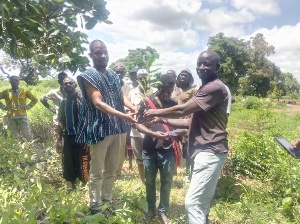Smallholder farmers in the country have been advised to adopt and plant new improved seed varieties to increase productivity.
Dr Rajeev Varshney, Research Programme Director of the International Crops Research Institute for the Semi-Arid Tropics (ICRISAT), India, it was the way forward to prevent lower crop yields.
He added that many of the developed countries “have higher crop yields than the developing countries because they cultivate new seed varieties".
He was speaking during a field observation trip to Tolon to assess the maturing stage of the Tropical Legume III project (TL III) new seed varieties cultivated by farmers in the Tolon District.
The new groundnut and soya bean seed varieties were produced by the Savanna Agricultural Research Institute of the Council for Scientific and Industrial Research (CSIR –SARI) with support from ICRISAT in partnership with SEND-Ghana and Bill and Melinda Gates Foundation.
These are resistant to disease and pest infection, and they have “very high yielding potential” with about 12.7 per cent food protein content.
Dr Varshney said ICRISAT and its partners would provide the technical resources and support to facilitate the cultivation of the new seed varieties and their distribution in markets within the Northern, Upper East and Upper West Regions.
He encouraged the farmers to come out with their own business plans without depending on funds and support from donors to ensure that they became self-dependent, to effectively manage their businesses.
Mr Desmond Sunday Adogoba, a socio-economist at CSIR-SARI and researcher on the TL III project, spoke on the gender component of the project and said it aimed not only at empowering women to be financially independent but to also strengthen the seed production systems in rural communities.
This had been done through the use of the Village Savings and Loans Associations (VSLA) to empower the women in areas like the Wantugu community in the Tolon District, Salinkpan in the Mion District, Gbimsi in West Mamprusi, Baribari in the Bawku Municipality and Tibani in the Nadowli-Kaleo District.
Mr Adogoba said the TL III project was working with 150 smallholder farmers in the five districts with 98 per cent women participation.
The smallholder farmers in these areas had been trained on how to plant the improved legume seed varieties, thereby helping them to understand the physical and extending structures of the seeds.
He said each group through their own funding had been able to cultivate a minimum of five acres of these improved seeds and aiming to distribute them within their communities after harvest to encourage other community members to adopt the new varieties.
During an interaction session with some of the farmers in the Tolon District, Madam Kadiri Mariama, the leader of the Mansungsim VSLA at Wantugu community, said she was expecting an increase in yield since the new legume seed varieties produced more seeds compared to the old varieties.
They were ready to adopt more new seed varieties that would be introduced in the community to help increase their productivity and income, she added.
She appealed to ICRISAT and its partners to assist the community by providing them with a shelling machine to aid them to process their harvest for effective storage.
Mr Bugri Kadiri, another farmer, said they had realized a faster growing rate in the new varieties than the old varieties they used to cultivate some years ago.
General News of Saturday, 8 September 2018
Source: ghananewsagency.org













